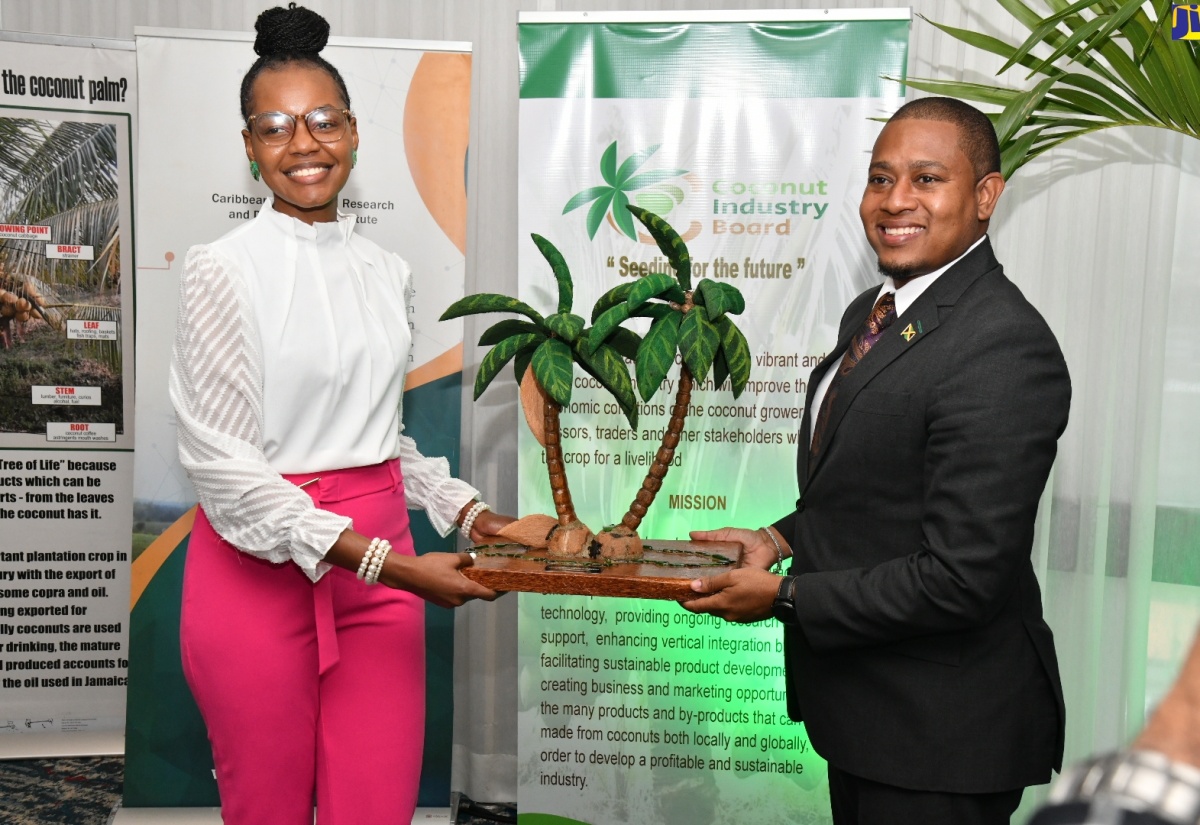Spread of Lethal Yellowing Disease Reduced by 70%
By: , March 5, 2024The Full Story
Jamaica, through the work of the Coconut Industry Board (CIB), has been able to reduce the spread of the lethal yellowing disease in the coconut industry by 70 per cent.
Minister of Agriculture, Fisheries and Mining, Hon. Floyd Green, made the disclosure at the opening of the regional training workshop on Sustainable and Resilient Coconut Production within a Changing Climate, held at The Jamaica Pegasus hotel, in New Kingston, on Monday (March 4).
“Through the CIB, we have contributed significantly to the coconut industry through research, especially in mitigating the lethal yellowing disease. Our research in this area has allowed us to develop varieties and hybrids with optimum resistance/tolerance to lethal yellowing, which has been plaguing the coconut industry, causing severe economic losses in the industry,” Mr. Green said.
“To this end, we have been able to reduce the spread of lethal yellowing by 70 per cent. Additionally, we have been able to see increased yields through the varieties that we have developed and those that are adapting more to our local climatic conditions,” he added.
Within this region, lethal yellowing disease was first discovered in the Cayman Islands in 1834 and was found in Jamaica 50 years later, in 1884.
It became a real threat to Jamaica after 1961 when it appeared in the Buff Bay area of Portland and became even more significant in the 1970s, when some 10 million ‘Jamaica Talls’ were destroyed.
The workshop is being held under phase two of the Alliances for Coconut Industry Development, Expansion and Enhanced Support in the Caribbean, a Regional Coconut Project.
During the event, the CIB will be facilitating technical sessions in areas such as establishment of coconut seed gardens; hybridisation techniques, practices and processes; coconut field management and climate-smart production practices; processing for value addition; and ecotourism.
“The outcome that will be derived from the training is that our smallholder farmers, micro, small and medium-sized enterprises (MSMEs) and institutions from across Jamaica and the region will be thoroughly equipped and groomed in coconut production, value addition and trade,” Mr. Green said.
Focus will also be placed on leveraging market linkages and investment into the sector, leading to further growth in the industry.
The Minister further noted that the project has already had a significant impact in Jamaica and has contributed significantly to the objectives of Jamaica’s National Coconut Sector Roadmap.
He stated that some of what was achieved was done through the collaborative efforts of entities such as the Ministry of Agriculture, Fisheries and Mining; Caribbean Agricultural Research and Development Institute (CARDI); CIB; Scientific Research Council; JAMPRO, Alligator Head Foundation; Rural Agricultural Development Authority (RADA); Knockalva Polytechnic College (KPC); input providers; coconut companies and farmers.
“Through their collaborative efforts we have been able to convene a national stakeholders’ platform for dialogue and brainstorming of solutions to issues facing our local coconut sector,” Mr. Green said.
Activities such as the establishment of 30 lead farmer climate-smart demonstration plots for smallholder farmer capacity and market linkages improvement for coconut and associated crops in St. Catherine, St. Thomas, St. Mary, Portland, Hanover, Trelawny and Westmoreland, with more than 300 second-ring farmers, have also been facilitated.
“We have been able to distribute over 100,000 intercrops, 30 black tanks, 10 irrigation systems, water pumps, fertilisers, 75,000 coconut seedlings for the establishment of diversified plots,” the Minister said.
Additionally, training sessions were also held with more than 200 farmers focusing on good agricultural practices, integrated management of major pests of coconut, mother palm selection, nursery establishment and management, fertiliser management and intercropping.
The Alliances for Coconut Industry Development, Expansion and Enhanced Support in the Caribbean, a Regional Coconut Project, is funded by the European Union (EU).
The project comprises 12 CARIFORUM countries and has been implemented through a partnership with CARDI, the International Trade Centre (ITC) and other important regional and national partners.



